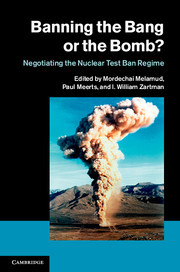Banning the Bang or the Bomb? Negotiating the Nuclear Test Ban Regime
Langue : Anglais
Coordonnateurs : Melamud Mordechai, Meerts Paul, Zartman I. William

Analyses the expansion of the nuclear arms control regime, evaluating Comprehensive Test Ban Treaty negotiations and preparations for on-site inspections.
The Comprehensive Test Ban Treaty (CTBT), negotiated between 1994 and 1996, is the latest development in the nuclear arms control regime. It continues to serve a vital role in preserving the privileged status of the nuclear weapons states and barring the way to proliferation. Banning the Bang or the Bomb? brings together a team of leading international experts who together analyse its negotiation as a model of regime creation, examining collective dynamics, the behaviour of individual countries, and the nature of specific issues. The book offers practical guidance and training for members of the Comprehensive Nuclear Test Ban Treaty Organization future inspectorate to help negotiate their way during an on-site inspection (OSI) in an inspected state. This is a valuable resource for researchers and professionals alike that turns an analysis of what has happened into a manual for what is about to happen.
Introduction: negotiating the creation and implementation of an international regime I. William Zartman and Mordechai Melamud; Part I. Negotiation: 1. Banning nuclear explosive testing: the historical context and steps to implement the CTBT Pierce S. Corden; 2. Negotiating the nuclear test ban: the verification debate and its effects on the negotiation process P. Terrence Hopmann; 3. The negotiating process: a view from the Chair Jaap Ramaker; 4. The importance of coupling in the limited test ban negotiations Fen Osler Hampson; 5. The role of civil society in negotiating the CTBT Rebecca Johnson; 6. CTBT negotiations: formulas and trade-offs I. William Zartman and Julia Lendorfer; 7. The US debate Chris McIntosh; 8. The Russian position on the CTBT Alexey Fenenko; 9. Explaining why India opted out of the CTBT Ulrika Möller; Part II. Verification: 10. Nuclear test ban verification: from negotiations to entry into force Hein Haak; 11. Enhancing the legal status of the CTBTO pending CTBT entry into force Franz Cede; 12. Can a monitoring and verification system be designed by negotiation? Nicholas Kyriakopoulos; 13. On-site inspections in the framework of CTBT verification: errors of the first and second kind Rudolf Avenhaus and Thomas Kriege; 14. Preparations for negotiations on the noble gas categorisation scheme Martin Kalinowski and Simon Hebel; 15. The case of Arcania: structure and actors in point of entry (POE) negotiations Ariel Macaspac Penetrante; 16. On-site inspection as a progression of negotiation cases Mordechai (Moti) Melamud; 17. Some preliminary thoughts on framing a training programme on negotiation for potential inspection teams P. Terrence Hopman; 18. Putting OSI on the table Paul Meerts and Mordechai Melamud; 19. Lessons from the CTBTO negotiation processes Mordechai (Moti) Melamud, Paul Meerts and I. William Zartman.
I. William Zartman is an internationally known analyst and theoretician of the negotiation process. He is Professor Emeritus of Conflict Resolution at the School of Advanced International Studies (SAIS), The Johns Hopkins University, member of the steering committee of the Processes of International Negotiation (PIN) Program at Clingendael (The Netherlands), member of the UN Academic Advisory Council on the Mediation Initiative, and advisor to the Secretary-General, and holds an honorary doctorate from Louvain University (Belgium) and a doctorate from Yale University. He is author and/or editor of two dozen books. Dr Zartman is associated with a number of key concepts in negotiation analysis, such as formula, ripeness and diagnosis. He has offered a new analytical framework for evaluating international regimes as recursive negotiations rather than as compliance.
Mordechai Melamud is a former research physicist with a PhD in experimental physics from the Weizmann Institute of Science (Rehovot, Israel), received in 1976. From 1967 Dr Melamud was employed by the Israel Atomic Energy Commission (IAEC) as a senior scientist and a Group Leader in experimental physics. He lectured at the Ben-Gurion University (Beer Sheba, Israel) and is co-author of more than a hundred publications in scientific journals. After 1997 his interest turned to the verification regimes of international treaties concerning nuclear disarmament. From 1998 he was employed at the IAEC headquarters as deputy director for international relations and as special assistant to the DG for the implementation of the Comprehensive Nuclear Test-Ban Treaty (CTBT) in Israel. From 1998 to 2002 he served as a member, and later the head, of the delegation of Israel to the CTBTO policy making organs. From 2002 until 2012 he was Chief of Training in the On-Site Inspections (OSI) Division of the CTBT Organization in Vienna, Austria, in charge of development of the training program for future inspectors under the OS
Mordechai Melamud is a former research physicist with a PhD in experimental physics from the Weizmann Institute of Science (Rehovot, Israel), received in 1976. From 1967 Dr Melamud was employed by the Israel Atomic Energy Commission (IAEC) as a senior scientist and a Group Leader in experimental physics. He lectured at the Ben-Gurion University (Beer Sheba, Israel) and is co-author of more than a hundred publications in scientific journals. After 1997 his interest turned to the verification regimes of international treaties concerning nuclear disarmament. From 1998 he was employed at the IAEC headquarters as deputy director for international relations and as special assistant to the DG for the implementation of the Comprehensive Nuclear Test-Ban Treaty (CTBT) in Israel. From 1998 to 2002 he served as a member, and later the head, of the delegation of Israel to the CTBTO policy making organs. From 2002 until 2012 he was Chief of Training in the On-Site Inspections (OSI) Division of the CTBT Organization in Vienna, Austria, in charge of development of the training program for future inspectors under the OS
Date de parution : 04-2014
Ouvrage de 410 p.
15.5x23.5 cm
Thème de Banning the Bang or the Bomb? :
© 2024 LAVOISIER S.A.S.



